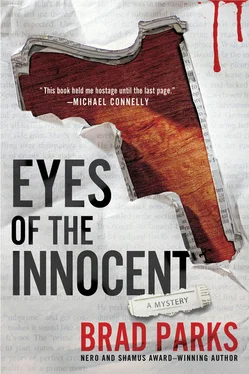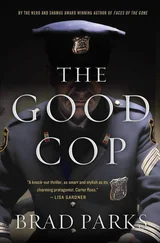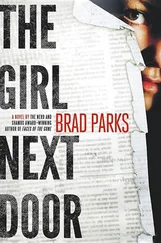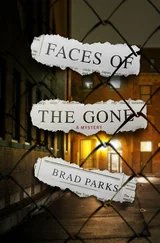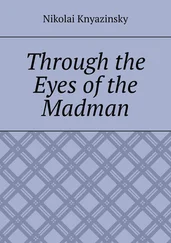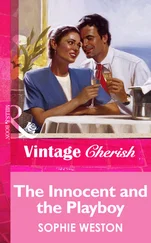Brad Parks - Eyes of the Innocent
Здесь есть возможность читать онлайн «Brad Parks - Eyes of the Innocent» весь текст электронной книги совершенно бесплатно (целиком полную версию без сокращений). В некоторых случаях можно слушать аудио, скачать через торрент в формате fb2 и присутствует краткое содержание. Год выпуска: 2011, ISBN: 2011, Издательство: Minotaur Books, Жанр: Триллер, на английском языке. Описание произведения, (предисловие) а так же отзывы посетителей доступны на портале библиотеки ЛибКат.
- Название:Eyes of the Innocent
- Автор:
- Издательство:Minotaur Books
- Жанр:
- Год:2011
- ISBN:0312574789
- Рейтинг книги:3 / 5. Голосов: 1
-
Избранное:Добавить в избранное
- Отзывы:
-
Ваша оценка:
- 60
- 1
- 2
- 3
- 4
- 5
Eyes of the Innocent: краткое содержание, описание и аннотация
Предлагаем к чтению аннотацию, описание, краткое содержание или предисловие (зависит от того, что написал сам автор книги «Eyes of the Innocent»). Если вы не нашли необходимую информацию о книге — напишите в комментариях, мы постараемся отыскать её.
Eyes of the Innocent — читать онлайн бесплатно полную книгу (весь текст) целиком
Ниже представлен текст книги, разбитый по страницам. Система сохранения места последней прочитанной страницы, позволяет с удобством читать онлайн бесплатно книгу «Eyes of the Innocent», без необходимости каждый раз заново искать на чём Вы остановились. Поставьте закладку, и сможете в любой момент перейти на страницу, на которой закончили чтение.
Интервал:
Закладка:
“What the hell?” I demanded.
“What?” he said, though he knew full well what.
“I thought you killed the story.”
“I did.”
“So why is it-”
“It wasn’t my call,” he said, spreading his hands as if to absolve himself of responsibility.
“I don’t understand.”
“Brodie saw ‘space heater’ high up in the story and his Willie started throbbing,” Szanto said.
It was long-standing Eagle-Examiner tradition that when Brodie liked a story, he was described as having a hard-on for it-or an erection, or a woody, or any number of the infinite variations to describe male sexual arousal. Why this usage evolved was lost to history. But the resulting imagery was seldom pleasant.
“I don’t care if he printed it out and dry-humped it on the conference room table so everyone could watch,” I replied. “How can we run that story knowing what we know?”
“Brodie said we could just take out the part about Akilah being an orphan. He said it was probably a misunderstanding that could be easily explained, and it was no reason to kill a story about the very important subject of space heater malfunction.”
“But I didn’t get a quote from the mortgage company,” I said. “What about getting the other side of the story and all that happy hooey?”
Szanto looked at me through tired eyes.
“We didn’t mention the name of the mortgage company anyway,” he rationalized. “So it’s not like you’ve maligned its reputation.”
I stared at Szanto as he fingered the cigarette he planned to light just as soon as he could run to the back stairwell where he-and untold scores of others-illegally smoked during the wintertime.
“So you agree with him?”
“I didn’t say that,” Szanto said. “I said it was his call. Look, you wanna argue with Brodie’s stiffie, you go ahead. Me? I don’t want to get poked in the eye.”
Neither did I. Brodie was a basically pleasant old man, but his management style did not involve toleration of open dissent. If he hadn’t made up his mind about something, he would stay quiet and listen to the discussion that ensued among lesser editors. But his decisions, once made, were notoriously final. I could storm into his office and make all kinds of noise, but it wasn’t likely to do any good. I’d have better luck trying to turn the ocean tides with a teaspoon.
“Fine,” I huffed. “But when we have to run a correction, it better not say ‘due to a reporter’s error.’ This isn’t on me.”
Szanto didn’t answer, choosing to end the conversation by turning his attention back to his computer screen and grumbling something too consonant-heavy to be understood.
That left me stuck in a curious spot. On the one hand, I was off the hook. I told my editors I had deep misgivings about a story. They ignored me. Woe to them.
But that was small comfort. I took a great deal of pride in getting a story right, or at least trying my damnedest at it. It went straight to the core of perhaps my deepest journalistic value: that the truth exists, and that it’s my job as a reporter to find it.
I realize that flies in the face of the moral relativism that has become so popular on campuses and in highfalutin big-think magazines, where the professors and editors will have you believe there is no such thing as the truth, only stories told from different perspectives. They’ll spin that marvelous bit of postmodern logic that says there are no absolutes and therefore we cannot possibly judge anyone else’s beliefs. And they’ll tell you journalists are hopelessly flawed creatures incapable of escaping their own innate biases long enough to ever approach anything resembling impartiality.
To which I reply: fiddle-faddle.
I’m not saying it’s simple to find and tell the truth. It takes a great deal of hard work, intellectual honesty, open-mindedness, and a willingness to keep listening to people even when your gut is telling you they’re full of it. Then it involves drilling through the layers of one’s cultural assumptions and prejudgments, all the way down to the mushy middle of all of us, where I believe there’s a basic humanity that tells us what’s right and what’s wrong. If we as writers apply that code-without the anchors of agenda or ideology-we can lift our prose to something that can be called the truth. It’s the very best of what journalism can and should be.
So to have a story running under my byline that I knew was suspect? It made my guts twist. I never wanted to be one of those writers who skimped on the facts simply because they got in the way of a good story. And it pissed me off, that’s what I was going to look like if Akilah’s story blew up in our faces-all because of Brodie and his space heater vendetta.
I went back to my desk, pondered what I might do with what remained of my evening, but couldn’t bat down my ire at the executive editor. Really, the man had left me only one option: go to McGovern’s and get drunk enough to start making bad decisions.
* * *
McGovern’s was your basic, beloved dive bar, from the ancient laminate floor tiles all the way up to the prehistoric corkboard ceiling. As an Irish bar that somehow survived white flight, it was legendary in Newark generally and among Newark newspapermen in particular. Many a generation of our trade had made it their first (and often last) stop after work to soothe the edges of a hard day on deadline with a few (and often more than a few) adult elixirs.
Long before it was our hangout, the guys from the Newark Evening News -the afternoon paper that once dominated the state, before its demise in the early seventies-used to hang out there, too. And somehow I hoped that if and when the Eagle-Examiner was ever replaced by some other news-gathering media, which looked increasingly likely given the dire shape of newspaper advertising revenues, those future journalists (or content providers, or information aggregators, or whatever they’d call themselves) would gather at McGovern’s as well.
By the time I arrived, the tables at the far side of the bar were filled by a few pitchers of Coors Light-why do kids drink that panther piss? — and a handful of Eagle-Examiner interns. The only one I knew that well was Tommy Hernandez, who was now in his second year as an intern with us. Only twenty-three, Tommy was one of the best natural reporters we had, a guy who knew how to hit the streets and find a story. He was still technically an intern-it’s how we got away with continuing to underpay him-but he had been given a promotion recently and was now our second reporter on Newark City Hall, a great gig for someone his age.
Tommy was the only son of the world’s strictest Cuban immigrant parents and he still lived at home, which made it all the more amusing his folks didn’t have the slightest clue he’s gay as Elton John’s eyewear collection. They just thought he had a lot of male friends who dance well.
“There you are!” Tommy sang out when he saw me. “Someone was loooooking for you.”
“Oh, yeah, who’s that?” I said, sitting down and fumbling with a salt shaker so I could pretend I didn’t care who or what he was talking about.
“Oh, you know who,” Tommy said, then switched into his best Sweet Thang impersonation: “Oh, my goodness, don’t you think Carter is such a good writer? Isn’t he just amaaaazing? Isn’t he sweeeeet?”
“Oh, stop,” I said.
“Oh, I will. She won’t,” Tommy said. “That girl has a bad case of Carter Ross Fever.”
I turned to the other intern sitting with Tommy, a young Korean woman named Mi-Ryong Kim who, in our brief interactions, always acted like she was afraid of me.
“The problem, Mi-Ryong, is that Tommy thinks he’s cute when he exaggerates. And he’s not.”
Читать дальшеИнтервал:
Закладка:
Похожие книги на «Eyes of the Innocent»
Представляем Вашему вниманию похожие книги на «Eyes of the Innocent» списком для выбора. Мы отобрали схожую по названию и смыслу литературу в надежде предоставить читателям больше вариантов отыскать новые, интересные, ещё непрочитанные произведения.
Обсуждение, отзывы о книге «Eyes of the Innocent» и просто собственные мнения читателей. Оставьте ваши комментарии, напишите, что Вы думаете о произведении, его смысле или главных героях. Укажите что конкретно понравилось, а что нет, и почему Вы так считаете.
